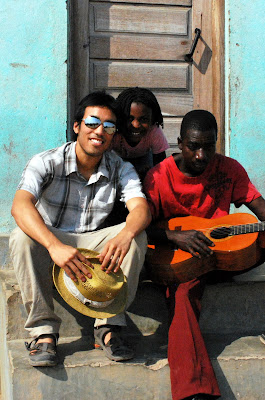There’s something that has been haunting me for a while now. There is this tv show that my host family loves to watch. It’s called Gugu. I don’t know what that stands for, but basically it’s the Brazilian version of the show Extreme Home Makeover. Every Sunday night, we gather round the tube to watch it. I don’t understand any of what is being said, but I’ve been learning a lot about the world by watching it with my upper middle class Mozambican family.
If you don’t know what Extreme Home Makeover is, the show basically selects a “needy” family in the states, sends the family on vacation for a couple weeks, and while they are out the producers get volunteers and contractors to build them a new home. But really the finished product isn’t so much a home as it is a palace. Usually a good portion of the start of the show is spent illustrating the unbearable living conditions the family used to live in, and usually a good portion of the end of the shows is spent on comparing the new and the old. A couple of new cars are given, sometimes a tractor, or something similarly ridiculous.
If it’s a good episode, the family will bawl their eyes out, the cameras will capture it all, and we all feel good about ourselves.
Gugu is very similar, but maybe half as extravagant. Brazil is solidly in the middle of the Human Development Index, so the starting home looks a little more run down than the American home. But the differences end there. A good amount of time spent on Gugu will highlight how the family didn’t have an electric stove to cook, usually how they don’t have enough beds for everyone, and maybe didn’t have a fridge to store food. The finished product isn’t so much of a palace as it kinda ends up a normal American home. A nice, new home complete with washer, drier, stove, and tv, but nothing ridiculous.
Exactly like the American show though, if it’s a good episode, the family will bawl their eyes out, the cameras capture will it all, and we all feel good about ourselves.
It’s all very moving.
But here’s what keeps me up at night:
I live in a middle class Mozambican neighborhood. Most of Mozambique looks like us. And no surprise, almost no house is as nice as the house shown in the beginning of each show. Almost none.
Almost no one has a refrigerator.
Almost no one has running water.
But a good number of homes have a tv.
Mud-wall houses will have a tv antennae sticking out the top and electrical wires running into the wall. And I’m willing to bet that we aren’t the only Mozambican family gathering around our tv on Sunday nights.
I don’t know what I’m trying to say, but I’ve been thinking.
I wonder what happens to our African brothers and sisters when our wealth is broadcasted on TV all day long across the world. Poverty is relative for sure, but there’s not much room for a relative world anymore with TV, internet, and cell phones.
I wonder if material poverty is less important than poverty of the soul. Houses here are humbler (of course there are mansions in this country, too), but no one works harder at keeping their house clean and chores done than a Mozambican mother. I’d say the biggest difference between Gugu homes, is that the homes on tv look like they’ve been given up on.
And I wonder if doing things FOR people actually robs people of their dignity and self worth; if there’s a point where building a mansion for a family subversively robs them of so much more. There is a time and place for emergency relief, for sure – like after Katrina or the earthquake in Haiti. But I don’t think that’s what those families on the show and the people of Mozambique need.
I don’t know what I’m trying to say, but I’m slowly learning that the restoration of things just isn’t good enough. There is a restoration of soul and of relationships that is gonna be crucial to the development of this nation. When the Portuguese left suddenly (technically they were forced out), they took a lot of the capacity needed to run the country with them. But that was around 40 years ago and the country is still here.
I believe in this country. Maybe it’s for us to figure out how to help but not get in the way.
Your brother,
Stephen
































